Graham Reid | | 6 min read
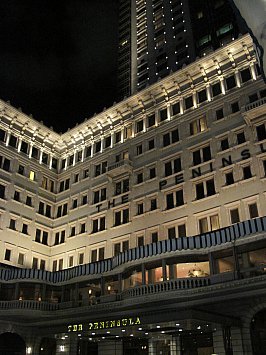
Only a fool would try to suggest that a
single building – in this instance, worse, a luxurious hotel –
could refract the story of city. But let's be foolish, because the
history of the Peninsula Hotel in Hong Kong, and the way we see it
today, contains bright flashes of that unique city's history.
The first time I saw the Peninsula was
more than four decades ago when Hong Kong – then a British colonial
outpost -- was a very different city.
I was with my father and had grown up
with stories of places like the Peninsula and the equally famous
Raffles in Singapore. My parents weren't of that old-style
Empire-and-the-Raj-mentality – indeed my dad was outraged that
mum's father who had served with distinction during the Great War was
a doorman at the Royal Infirmary in Edinburgh and was obliged to
salute junior doctors.
But they saw these handsome places as
repositories of glamorous stories and intriguing politics, where
writers such as Somerset Maugham would hold court over a gin sling.
The Peninsula and Raffles belonged in that exotic age of PanAm
Clippers or the trans-Siberian railway when only the most privileged
could afford to travel in them.
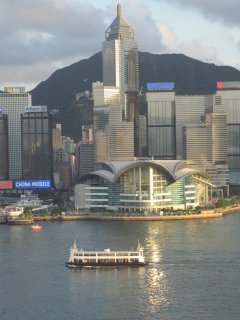 I'd also been aware of such risque
stories about Hong Kong as The World of Suzie Wong about a
kind-hearted prostitute – we had a funny illustrated book with a
Suzie in a daring cheongsam – and that the British had signed their
articles of surrender at the Peninsula in 1941.
I'd also been aware of such risque
stories about Hong Kong as The World of Suzie Wong about a
kind-hearted prostitute – we had a funny illustrated book with a
Suzie in a daring cheongsam – and that the British had signed their
articles of surrender at the Peninsula in 1941.
At that time with my dad we couldn't
afford to stay there – we stayed with friends and my parents most
often took a room at the nearby Mariners' Club if I recall. But I can
well remember walking through the handsome, airy lobby as people,
Europeans mostly, went about their mysteriously elegant business.
The Peninsula confirmed everything of
my boyhood imaginings.
Every time I passed through Hong Kong
subsequently I would admire the place, but never once went back
inside.
I watched it change and grow, just as
the city around it did. In the early 90s two huge tower blocks of
rooms reared up behind the reassuringly solid and delightfully
columned frontage, and I heard that high-end fashion shops like
Cartier and Louis Vuitton had moved into the chic shopping arcade.
More recently I read about the Philippe Starck-designed restaurant
and bar on the 28th floor. I wanted to have a cocktail
there and watch the night lights of that remarkable city with its
“Fragrant Harbour”.
And in all this, the Peninsula Hotel
mirrored the changing face of Hong Kong from colonial outpost where
locals were servile to Europeans, through those years when it served
as a listening post on China, and to the closing overs of Empire when
the Union Jack came down in '97. Then Hong Kong became that
outward-looking Chinese city which, in an interesting reversal, now
listened in on the rest of the world, and broadcast something of
itself and its ambitions.
Money always talked in Hong Kong, and
perhaps nowhere more visibly than in the changing face of the
Peninsula which opened in 1928, a more elegant era.
And then, in what seemed like a dream,
my wife and I stayed there.
I'm sure I bent her ear with stories my
parents had told me, of my previous encounters from the outside, of
how I wanted to see Starck's famous Felix overlooking the harbour and
Hong Kong island opposite . . .
I needn't have worried about the view
from Felix because our room on the twentysomething floor – with a
large telescope and wrap-around windows -- took in everything.
The previous place I had stayed at in
Hong Kong had been a shabby place way up and off Nathan Road where
barely a word of English was spoken and there was none on shop signs.
It was up past what used to Juno's revolving restaurant where I'd
been with my dad all those decades back and everything was in
English, and you could eyeball passengers in planes landing at Kai
Tak.
So because of that previous experience
I convinced myself I deserved this brief residency in the sumptuous
Peninsula which I had long admired.
In truth, I had done nothing to earn
it.
We were guests of the hotel, and had
been since the Rolls Royce Phantom picked us up at the airport. It
had been a seamless transition from Business Class through Customs
(someone else got our bags) and into the Roller. From disembarking to
back seat in fewer than five minutes.
“So this is how Rod Stewart lives,”
I said to my wife as we crossed those handsome bridges above Ma Wan
Island, where two days later we would go to see a bizarre life-size
replica of Noah's Ark.
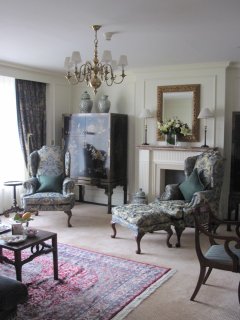 If there had been a check-in at the
Peninsula it went past with equal ease and within a few minutes –
arriving in our suite just after out luggage – we were looking out
towards Hong Kong island draped in misty low clouds of humidity and
glowering blue-black thunderheads above. On any day the vista would
be dramatic, the unexpectedness of this made it more so.
If there had been a check-in at the
Peninsula it went past with equal ease and within a few minutes –
arriving in our suite just after out luggage – we were looking out
towards Hong Kong island draped in misty low clouds of humidity and
glowering blue-black thunderheads above. On any day the vista would
be dramatic, the unexpectedness of this made it more so.
The Peninsula today is an emblem of
Euro-directed style and the commercial life of this city where money
flows, and where there is a visible line between the new thrusting
Chinese version of capitalism and the old world down backstreets just
a few blocks away.
From Starck's sky-high restaurant where
we watched lasers cut the sky at night and toasted my wife's birthday
with that long-promised cocktail to the discreetly located, tasteful,
luxurious and muted Salon Da Ning with its themed rooms (Madame Da
Ning's boudoir, the Africa room with its animal skins and wooden
furnishings, Bailar room with an old gramophone) some 30 floors
below, the Peninsula breaths style and cool internationalism.
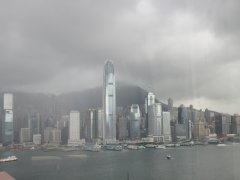
As with the city itself, the Peninsula
is grabbing at the 21st century – yet it also keeps
elements of its past.
Yes, there is a breathtakingly
beautiful and relaxing spa, and a Greco-Roman pool I had to myself
one morning. There are restaurants and cocktail lounges, Gucci and
Armani and 80 other boutique stores. There is a cooking academy (with
classes for kids) and all the rest. But the tradition of high tea
remains.
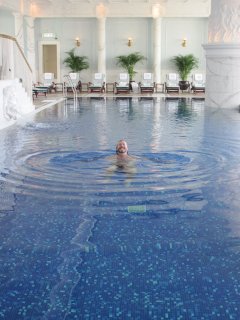 The difference now is that where once
-- a long time ago I have to remind myself -- this was when proper
English ladies and their daughters might gather for cucumber
sandwiches and tea in the fan-cooled lobby, now it is young and elegant
Chinese women and their daughters – some even in long white gloves
– who pose gracefully over the teacups.
The difference now is that where once
-- a long time ago I have to remind myself -- this was when proper
English ladies and their daughters might gather for cucumber
sandwiches and tea in the fan-cooled lobby, now it is young and elegant
Chinese women and their daughters – some even in long white gloves
– who pose gracefully over the teacups.
The history goes on, in a new and
different way. It seemed to me a lot more had been gained than lost.
On our last night, after spending an
hour just looking out the window at the ferries, junks and
white-hulled gin-palace yachts plying the harbour, we went back to
Felix for a farewell drink.
We knew we would probably never be back
to the sublime comfort and luxury of the Peninsula Hotel, but once in
a lifetime was enough to dwell on for years to come.
I thought of what my Scottish mum used
to say, “Och, if yer ain folk could see you the noo.”
Well, they wouldn't have recognised me
anyway.
I was Rod Stewart.

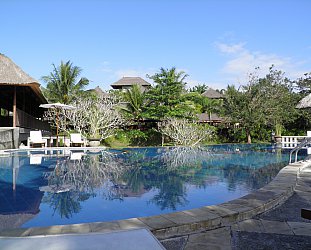
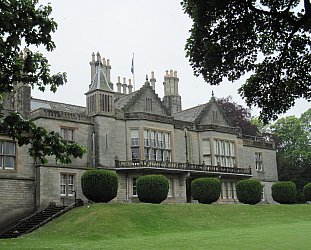
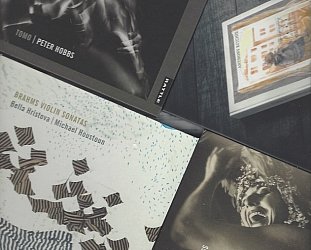

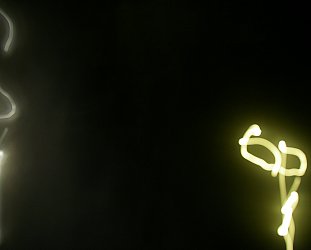

post a comment